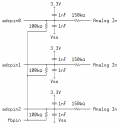Multi-Input ADC
 ErNa
Posts: 1,845
ErNa
Posts: 1,845
Sometime there is need to measure more than two slowly changing analog values. This obviously can be done:
There is one feedback pin which can drive as much 100 k resistors in parallel and more than one input can be used as comparator inputs. The active inputpin can be selected on the fly and after waiting some time, the selected analog input stabilizes and is not influenced by the other inputs. Following just my simple test software in Spin.
[code]
' Test MUX-AD-Converter: feedback Control Output 23, Inputs: 20, 21, 22
ADCOutPin := 23
ADCInPin := 22
DIRA[noparse][[/noparse]23]~~ ' Pin 23 Control Output
CTRA := %01001_000 << 23 + ADCOutPin << 9 + ADCInPin
FRQA := 1 ' Modus f
ModEdit: Add image of ASCII art
3.3V

1nF 150kΩ
adcpin0 ────────┳──╋─────────── Analog In
100kΩ 1nF
┌──────┘ 
│ Vss
│
│ 3.3V
│ 
│ 1nF 150kΩ
adcpin1 ─┼──────┳──╋─────────── Analog In
│ 100kΩ 1nF
┣──────┘ 
│ Vss
│
│ 3.3V
│ 
│ 1nF 150kΩ
adcpin2 ─┼──────┳──╋─────────── Analog In
│ 100kΩ 1nF
fbpin ─┻──────┘ 
Vss
There is one feedback pin which can drive as much 100 k resistors in parallel and more than one input can be used as comparator inputs. The active inputpin can be selected on the fly and after waiting some time, the selected analog input stabilizes and is not influenced by the other inputs. Following just my simple test software in Spin.
[code]
' Test MUX-AD-Converter: feedback Control Output 23, Inputs: 20, 21, 22
ADCOutPin := 23
ADCInPin := 22
DIRA[noparse][[/noparse]23]~~ ' Pin 23 Control Output
CTRA := %01001_000 << 23 + ADCOutPin << 9 + ADCInPin
FRQA := 1 ' Modus f
ModEdit: Add image of ASCII art



Comments
Post Edited (Rayman) : 4/2/2008 10:30:38 AM GMT
CON ADCNmb = 3 ' Number of inputs to scan ADCOutPin = 23 ' Control output in for ADC ADCInPin = 20 ' First input Pin, ADCNmb consecutive pins DAT ADCIdx long 0 ' Index of Input ADCMux ADC_MuxV0 long 0 ' value of input 0 during measuring time ADC_MuxV1 long 0 ' and so on ADC_MuxV2 long 0 ' ADCStrtTime long 0 ' start time last conversion ADC_Values ' analog values normalized ADC_Value0 long 0 ADC_Value1 long 0 ADC_Value2 long 0 if cnt - ADCStrtTime > clkfreq/50 ' every second fifty times, if you like ADC_Mux[noparse][[/noparse]ADCIdx] := phsa - ADC_Mux[noparse][[/noparse]ADCIdx] ADCStrtTime := cnt - ADCStrtTime ADC_Values[noparse][[/noparse]ADCIdx] := ADC_Mux[noparse][[/noparse]ADCIdx] / (ADCStrtTime /1000) ADCIdx := (ADCIdx+1) // ADCNmb CTRA := %01001_000 << 23 + ADCOutPin << 9 + ADCInPin+ADCIdx ' activate next control input ADC_Mux[noparse][[/noparse]ADCIdx] := phsa ADCStrtTime := cntThis gives quite stable values and the module can be integrated into a loop with varying runtime. I didn't think about to optimise the memory consumption, only try to make it working
▔▔▔▔▔▔▔▔▔▔▔▔▔▔▔▔▔▔▔▔▔▔▔▔